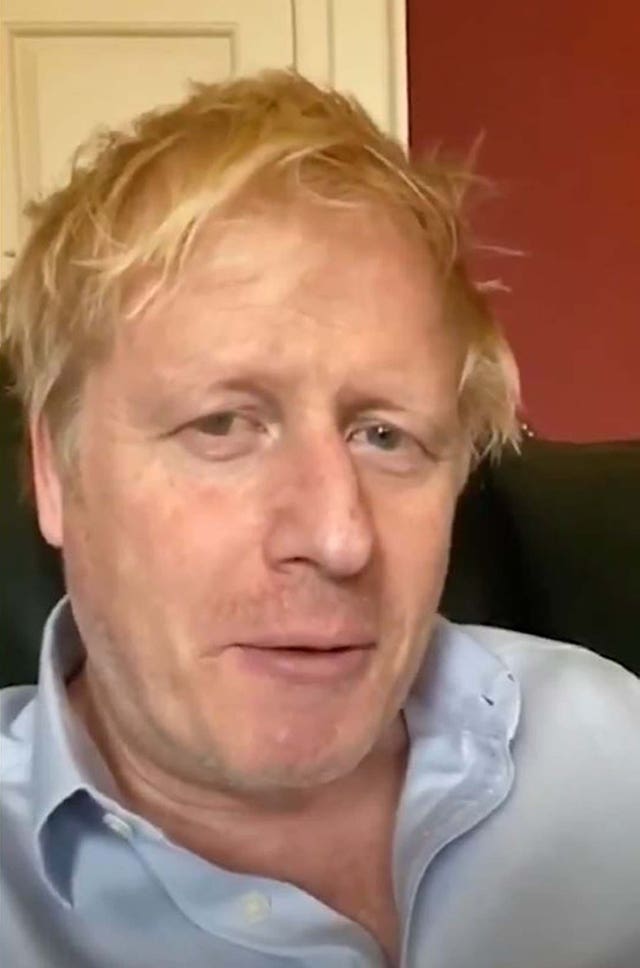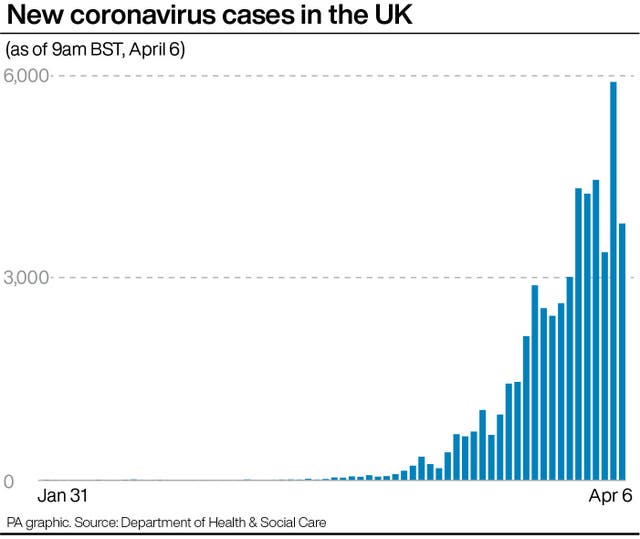Dominic Raab will take charge of the Government’s response to the coronavirus crisis after the Prime Minister was transferred to intensive care.
Boris Johnson was admitted to intensive care on Monday after his Covid-19 symptoms worsened during the afternoon.
The Conservative Party leader ceded control “where necessary” to Foreign Secretary and First Secretary of State Mr Raab, who will deputise for the PM.
READ MORE: Coronavirus: Boris Johnson in intensive care as condition worsens
The developments follow repeated questions to Downing Street about how the PM was ill enough to be allotted a hospital bed but deemed fine to lead the Government.
Mr Raab’s first job as stand-in PM on Tuesday will be to lead the Government’s emergency daily coronavirus “war Cabinet” meeting with senior colleagues and the UK’s chief medical officer, Professor Chris Whitty, and chief scientific adviser, Sir Patrick Vallance.
He has vowed to follow the “direction” set by the PM for tackling the deadly virus, although admitted at the Number 10 press briefing that the pair last spoke on Saturday.
Mr Johnson was moved to intensive care at about 7pm on Monday and was understood to be conscious but moved as a precaution should he require a ventilator.
The 55-year-old had been admitted to St Thomas’ Hospital in central London on Sunday evening after testing positive for coronavirus 10 days previously.
US President Donald Trump said Mr Johnson was in a “very serious” condition to have been admitted to intensive care and offered prayers for his recovery.
At a White House press briefing on Monday, Mr Trump said: “I want to send our very best wishes to a very good friend of mine and a friend to our nation, Prime Minister Boris Johnson.
“We’re very saddened to hear that he was taken into intensive care this afternoon and Americans are all praying for his recovery.
“He’s been a really good friend. He’s been really something very special: strong, resolute, doesn’t quit, doesn’t give up.
“But when you get brought into intensive care, that gets very, very serious with this particular disease,” he added.
 President Donald Trump has sent his best wishes to Boris Johnson (AP Photo/Alex Brandon)
President Donald Trump has sent his best wishes to Boris Johnson (AP Photo/Alex Brandon)
Buckingham Palace confirmed the Queen was being kept informed by Downing Street about the condition of Mr Johnson – the 14th prime minister of her reign.
In a statement recorded after Mr Johnson’s admission, Mr Raab said: “The Government’s business will continue.
“The Prime Minister is in safe hands with that brilliant team at St Thomas’ Hospital, and the focus of the Government will continue to be on making sure that the Prime Minister’s direction, all the plans for making sure that we can defeat coronavirus and can pull the country through this challenge, will be taken forward.”
A Number 10 spokesman said: “Over the course of this afternoon, the condition of the Prime Minister has worsened and, on the advice of his medical team, he has been moved to the intensive care unit at the hospital.”
READ MORE: Coronavirus in Scotland: J.K. Rowling reveals Covid-19 symptoms
The Prime Minister’s official spokesman said on Monday morning that Mr Johnson had been taken to hospital on the advice of his doctor and as a “precaution”, and that it was not an emergency admission.
Downing Street, which had previously described his symptoms as “mild”, switched to describing them as “persistent”.
Last night, on the advice of my doctor, I went into hospital for some routine tests as I’m still experiencing coronavirus symptoms. I’m in good spirits and keeping in touch with my team, as we work together to fight this virus and keep everyone safe.
— Boris Johnson #StayHomeSaveLives (@BorisJohnson) April 6, 2020
They included a cough as well as a continuing high temperature, more than a week after he first tested positive.
His move to intensive care came just a few hours after Mr Raab told a press briefing that the PM remained in charge of the Government despite remaining under observation.
Earlier on Monday afternoon, Mr Johnson tweeted: “Last night, on the advice of my doctor, I went into hospital for some routine tests as I’m still experiencing coronavirus symptoms. I’m in good spirits and keeping in touch with my team, as we work together to fight this virus and keep everyone safe.”
Mr Johnson’s fiancee, Carrie Symonds, previously said she had been suffering Covid-19 symptoms, but is “on the mend”.
 Screengrab taken from Boris Johnson’s twitter account of the Prime Minister who has been moved to intensive care
Screengrab taken from Boris Johnson’s twitter account of the Prime Minister who has been moved to intensive care
Ms Symonds, 32, who is expecting the couple’s first baby in early summer, said she was not tested for the virus.
Health Secretary Matt Hancock is already back at work after having tested positive for coronavirus.
And Chief Medical Officer Professor Chris Whitty returned to work on Monday after developing symptoms while the PM’s chief adviser, Dominic Cummings, has also self isolated.

Responding to the news, Labour leader Sir Keir Starmer tweeted: “Terribly sad news. All the country’s thoughts are with the Prime Minister and his family during this incredibly difficult time.”
Chancellor Rishi Sunak tweeted: “My thoughts tonight are with Boris Johnson and Carrie Symonds.
“I know he’ll be getting the best care possible and will come out of this even stronger.”
Fellow world leaders wished the PM well, including French president Emmanuel Macron who tweeted that his thoughts were with Mr Johnson, his family and the British people “at this difficult time”.
Sir Lindsay Hoyle, Speaker of the House of Commons, said: “I know the thoughts and prayers of everyone across the House are with the Prime Minister and his family right now.
“We all wish him a speedy recovery.”
The Speaker also praised efforts by staff for putting together plans for MPs to meet virtually after Easter if lockdown measures are still in place.
“I really hope we can return to work virtually and safely after March 21, subject to the advice of Public Health England,” he said.
Meanwhile, the latest official figures showed 5,373 patients have died in hospital after testing positive for coronavirus in the UK as of 5pm on Sunday – an increase of 439 on the previous day.
The most recent figures from the Intensive Care National Audit and Research Centre (ICNARC), based on a sample of 2,248 coronavirus patients in UK intensive care units, found that 73% of patients were men and 27% were women.


Why are you making commenting on The Herald only available to subscribers?
It should have been a safe space for informed debate, somewhere for readers to discuss issues around the biggest stories of the day, but all too often the below the line comments on most websites have become bogged down by off-topic discussions and abuse.
heraldscotland.com is tackling this problem by allowing only subscribers to comment.
We are doing this to improve the experience for our loyal readers and we believe it will reduce the ability of trolls and troublemakers, who occasionally find their way onto our site, to abuse our journalists and readers. We also hope it will help the comments section fulfil its promise as a part of Scotland's conversation with itself.
We are lucky at The Herald. We are read by an informed, educated readership who can add their knowledge and insights to our stories.
That is invaluable.
We are making the subscriber-only change to support our valued readers, who tell us they don't want the site cluttered up with irrelevant comments, untruths and abuse.
In the past, the journalist’s job was to collect and distribute information to the audience. Technology means that readers can shape a discussion. We look forward to hearing from you on heraldscotland.com
Comments & Moderation
Readers’ comments: You are personally liable for the content of any comments you upload to this website, so please act responsibly. We do not pre-moderate or monitor readers’ comments appearing on our websites, but we do post-moderate in response to complaints we receive or otherwise when a potential problem comes to our attention. You can make a complaint by using the ‘report this post’ link . We may then apply our discretion under the user terms to amend or delete comments.
Post moderation is undertaken full-time 9am-6pm on weekdays, and on a part-time basis outwith those hours.
Read the rules hereLast Updated:
Report this comment Cancel